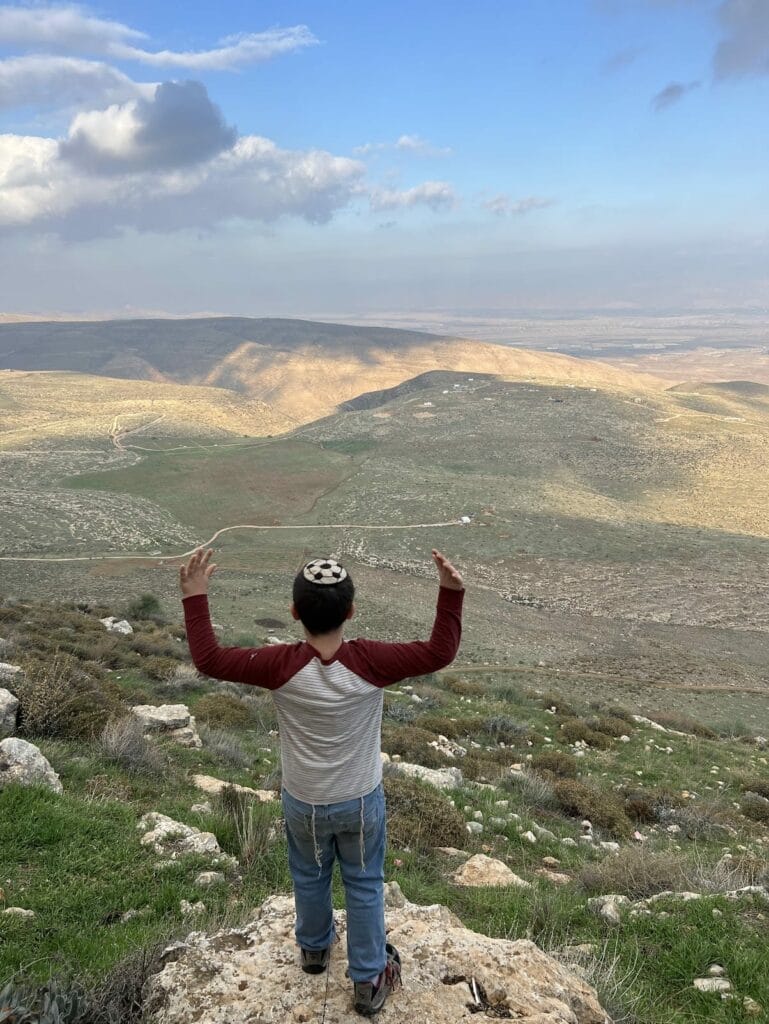
This was a breakthrough week for my boys in elementary school. On Sunday, we received a message via WhatsApp that they would be (partially) returning to their regular school schedule. No more 12:45 PM homecoming, a dismissal time instituted a week or so into the war due to staff shortages and security concerns. From now on (at least until the next surprise) we’d be back to routine. What a relief to all of us frazzled parents, who had been trying to juggle long afternoons at home. For some reason, school on Fridays was still off the table, which was okay with me. I’d been enjoying our kid-friendly hiking Fridays – we all needed some low-key time together outdoors.
Just after the first message, we received another WhatsApp: On Monday, the school would be holding parent teacher meetings. This led me to pause perplexedly, as I wondered how my 6th grader’s teacher, who had been fending off Hezbollah in Northern Israel until just last week, would be up to the task of providing an evaluation. At least it would be nice to see his face and receive some news about the northern border…
Yes, school as usual seemed to be resuming, after a long, long break in regularity. We’re all familiar with the phrase “Acharei HaChagim,” heard frequently around Israel during the month of September. Once past the disorder of summer vacation, a return to routine would seem to be in order. But instead, we all know that the holidays will only upend that routine. Therefore, we implicitly agree on a different national resumption of real life: Acharei HaChagim – After the holidays. College classes begin then. Long awaited contractors will finally become available. And regular life will, finally, go on.
2023 seemed no different from any other year at first. With the holidays’ arrival in mid-September, there was no reason to really resume regular life until afterwards. But this year, there was no After the Holidays. Instead, war arrived, bringing with it tumult and uncertainty. For the two months between Shmini Atzeret and Hanukkah, our entire nation was in a state of total shock, trauma even. Acharei HaChagim became Acharei HaMilchama (after the war). Since October 7th, we’ve all had trouble sleeping, eating regular meals, and doing normal things. We are a nation collectively glued to the news, constantly curious, filled with anticipation about how this national disaster will unfold.
But lately, since the holiday of Hanukkah has come and gone, I’ve noticed a change. It seems that many of us are finally ready to get back to routine, as bewildering as that seems. Isn’t “routines in a period of unpredictability” sort of an oxymoron? With loved ones on the battlefront, almost 150 hostages still in Gaza, and the news of tragic deaths arriving daily, it’s hard to imagine what a return to the regular ritual of life would even look like. Despite these hard facts, life does go on. As it should: according to guidelines for managing trauma, returning to routine is an essential part of avoiding future psychological distress.
Even Israel’s Home Front Command (which most of us recognize from our app to forewarn of incoming rockets) has issued guidelines on how to return to routines and cope with stress of war. According to Colonel Yaron Bar Dayan, during war time, it is normal to feel sadness and a lack of will to get out of bed and go on with life. This, we are told, is a natural reaction to traumatic events. The important thing is how we deal with these feelings. According to Bar Dayan, it is a return to routine that helps us avoid becoming part of the 5% of the population who will, eventually, suffer from post-traumatic stress, something we all want to avoid. He explains, “It is important to separate sleep…and wakefulness. The main way to do so is by adopting regular habits.”
Ever wonder how soldiers manage psychological stress while serving during wartime? With a son in Gaza, I have. Bar Dayan explains,” In the army, even in war time, there is a routine of wearing uniform, shaving, and shining shoes. When a person performs tasks that separate day from night, he turns from a sleeping person into a waking person.”
I’ve heard about this soldier-like adherence to routine from my son, who always made sure to have the proper clothing and polished shoes during peace time. Now, during the tumult of war, I’m guessing these skills are serving him well. Just a few days ago, he was able to return home for a quick, post-injury checkup. He showed up in full army gear, boots laced and shined, but then changed into civilian clothes so he could give his fatigues a proper wash during his two-hour break.
After my son’s appointment, I drove him back to the drop-off point in Zikim – he was headed back into Gaza, returning to the rituals of war. On the long drive, we turned on 106.7 Lite FM Montreal, an old favorite radio station he had introduced me to years back. “I forgot about this,” he said with a smile as he cranked up the tunes.
We sang along to the music, enjoying unseasonably beautiful weather and the views of late-December green fields. Here we were, back in the midst of the rainy season once again. Time certainly had passed since Sukkot and the end of the summer dry season, even if it had seemed to stand still.
“You know my old unit was sent out of Gaza?” my son said, “They’re back in yeshiva, back to routine.”
“That’s great,” I replied, “But don’t they need them anymore? Aren’t we still at war?”
“Yeah, but a lot has been accomplished in Gaza,” he explained, “The army doesn’t need such a massive force at this point.”
“At least until Lebanon,” I conjectured, the conversation then trailing off into silence. My son cranked up Mariah Carey, and we enjoyed our last few moments together before he headed back into the war zone.
Yes, many of us are trying to get back to routine, however frightening that is under the circumstances. But just in case I was beginning to feel too settled, I received this message from my younger son’s teacher on the morning of his scheduled parent teacher meeting:
“My soldier son was lightly injured last night in Gaza and is now recovering in Hadassah Hospital. Meetings for third grade parents are postponed.”
I did get to meet with my sixth-grade son’s Rav though, a sweet young fellow who couldn’t have been older than 30. With a bright smile, he told us how much he missed the kids while he was serving up north, especially our son, an extremely orderly 11-year-old who fixes all technical problems in class. “I told the boys that I wished I could have brought them all with me to the Golan, where I was in Totchanim (artillery). They would have done a great job there,” he enthused with a charming smile, “And your son, he would have managed the sights on the cannon. You must be spot on and point it just so – he would have done it perfectly.”
A smile and laughter came to my face, concealing my inner thoughts. It was nice that this teacher had already pegged my son – he understood his nature well enough to assign him a position in the army. But this conversation was also…frightening.
“The truth is, we are doing just as important work back here in school,” he went on, “Together in class we say Tehillim (Psalms) and pray for victory. Right now, our nation needs those prayers.”








Why am I crying as I read the closing sentences? Am Yisrael Chai!
Such a beautiful article. You have given us a gift because only someone in your position, has the right to say this.
Yet we all really need to hear it.
Thank you. Thank you.
And may your son and all his comrades experiece safety and protection.
Structure and routine are important for everyone
I daven for your son and all our chayalim- and pray they all return safely
And to the moms and wives who have to hold down the fort meanwhile-
U r the real heroines of our story!
Together We Will Win!